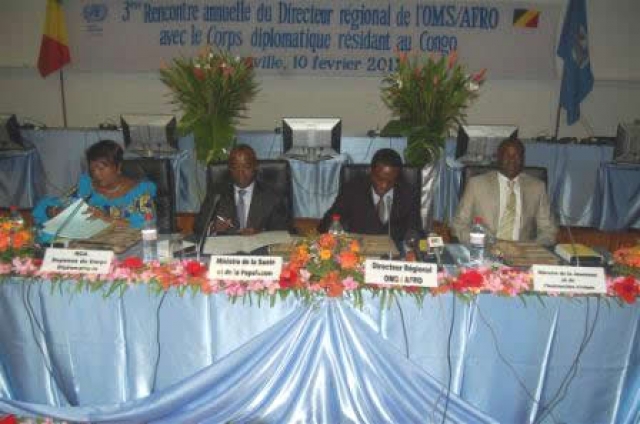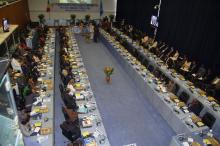Dr Sambo calls on Diplomatic Corps to advocate for investments in health
 Brazzaville, 10 February 2012 – The World Health Organization (WHO) Regional Director for Africa, Dr Luis Sambo, on Friday (10 February) called on the Brazzaville-based diplomatic community to advocate with their national governments for more investments in health. He made the call whilst briefing the diplomats on the health situation in the WHO African Region, progress towards the attainment of the Millennium Development Goals (MDGs) and the strategic directions for WHO's work in the Region for 2010 - 2015.
Brazzaville, 10 February 2012 – The World Health Organization (WHO) Regional Director for Africa, Dr Luis Sambo, on Friday (10 February) called on the Brazzaville-based diplomatic community to advocate with their national governments for more investments in health. He made the call whilst briefing the diplomats on the health situation in the WHO African Region, progress towards the attainment of the Millennium Development Goals (MDGs) and the strategic directions for WHO's work in the Region for 2010 - 2015.
The event was attended by Minister of Health, Prof George Moyen, Minister for Youth and Civic Education, Anatole Collinet Makosso and about 50 heads and representatives of diplomatic missions based in Brazzaville, Congo. For the first time, representatives of African missions accredited to the United Nations Office in Geneva participated in the meeting, the third such between Dr Sambo and the Brazzaville-based diplomatic community.
Progress towards achieving the Millennium Development Goals
Dr Sambo informed the diplomats that countries in the African Region had recorded varying degrees of success in the health-related MDGs Nos. 4, 5 and 6.
He stated that with regard to MDG No.4 -- reducing child mortality – current figures showed that child mortality had fallen from 165 per 1 000 live births to 118 deaths per 1 000 live births, with 27 countries having made some progress, and 12 not recording any progress. With a ratio of 620 maternal deaths for 100 000 live births, little progress has been made in achieving MDG No. 5 which is to reduce by three-quarters, between 1990 and 2015, the maternal mortality ratio.
On progress in achieving MDG No. 6, combating HIV/AIDS, malaria and other diseases, Dr Sambo provided the following highlights: in 2010, 22.9 million people in the Region were living with HIV; 1.9 million new HIV infections and 1.2 million HIV-related deaths were recorded; and access to antiretroviral therapy by people who need it rose to 49% from 2% in 2003. Good progress, with sub-regional variations, has been made in reducing mother to child transmission of HIV.
On tuberculosis (TB), the Regional Director said that about 46% of TB patients in the Region were also HIV positive while 76% of all people co-infected with TB and HIV lived in the African Region.
He stated that malaria continued be a public health problem in the Region which records 81% of all global episodes, 91% of deaths, and a very high rate of malaria-related deaths of children and pregnant women. He noted however that the scaling up of malaria interventions has reduced the incidence of malaria and deaths due to the disease by more than half in 13 countries.
Dr Sambo also spoke of the menace of infectious diseases such as cholera and haemorrhagic fevers; vaccine-preventable diseases such as measles and polio, saying that efforts should be made by all to interrupt wild poliovirus transmission in Africa in 2012.
He explained that the ever-present threat of epidemics, natural disasters and humanitarian crises informed the decision of Health Ministers of the Region to approve the establishment of the African Public Health Emergency Fund (APHEF). The Fund's brief is to mobilize, manage and disburse additional resources from Member States for responding rapidly and effectively to public health emergencies of national and international concern.
The Regional Director also made recommendations to address the challenges facing countries in their quest to attain the MDGs. He noted that WHO's work in the African Region is guided by the Strategic Directions for WHO 2010 – 2015 which focuses on: enhanced WHO leadership role on normative and policy guidance; strengthening health systems; putting the health of mothers and children first; accelerated actions on HIV/AIDS, malaria and tuberculosis; prevention and control of communicable and noncommunicable diseases and accelerating response to the determinants of health.
Reform at WHO
Touching on the on-going reform at WHO, he stated that this comprised: a definition of the Organization's priorities and general programme of work; the functioning of WHO's governing bodies at international and regional level, and administrative reform, including new methods of evaluation.
He also told the audience that the WHO African Region, adversely affected by the international on-going financial crises, now operates with a deficit of $400 million. He added that this has forced the organization to reduce staff, resulting in reduced capacity to meet requests from countries.
Dr Sambo said that although the future was uncertain, he was optimistic that the international community as well as national governments would take the necessary steps to ensure adequate financing for the work of WHO in Africa.
In his remarks, the Minister of Health of Congo, Prof. Georges Moyen, expressed his country's support for the African Public Health Emergency Fund.
He stated that the strategic directions of WHO as presented by Dr Sambo was a welcome development especially for a country like Congo which has declared 2012 the "year of health" with the aim of accelerating health coverage for the attainment of the MDGs.
Speaking on behalf of the diplomatic community, the Dean of the Diplomatic Corps in Brazzaville, Mrs Marie Charlotte Fayanga, said "We shall do our job by relaying the information you have provided us to our home governments."
Mrs Fayanga, who is the Ambassador of the Central African Republic to Congo, also described as "highly laudable" the idea of establishing an African Public Health Emergency Fund which was proposed by Dr Sambo and endorsed by the 61st session of the WHO Regional Committee for Africa.
The next meeting between Dr Sambo and the Diplomatic Corps accredited to Congo is expected to be held in February 2013.
For more information, please contact:
Communications, Advocacy and Media (CAM) Unit
Collins Boakye-Agyemang + 4724139420 E-mail: Boakyec [at] afro.who.int (Boakyec[at]afro[dot]who[dot]int)
Sam Ajibola +4724139378 E-mail: Ajibolas [at] afro.who.int (Ajibolas[at]afro[dot]who[dot]int)
Flavienne Issembe + 4724139352 E-mail: Issembef [at] afro.who.int (Issembef[at]afro[dot]who[dot]int)
Joana Teixeira + 4724139382 E-mail : Teixeiraj [at] afro.who.int (Teixeiraj[at]afro[dot]who[dot]int)
Linda Muzenda +4724139280 E-mail: Muzendal [at] afro.who.int (Muzendal[at]afro[dot]who[dot]int)
Armile Onlinou +4724139362 E-mail: Onlinoua [at] afro.who.int (Onlinoua[at]afro[dot]who[dot]int)



